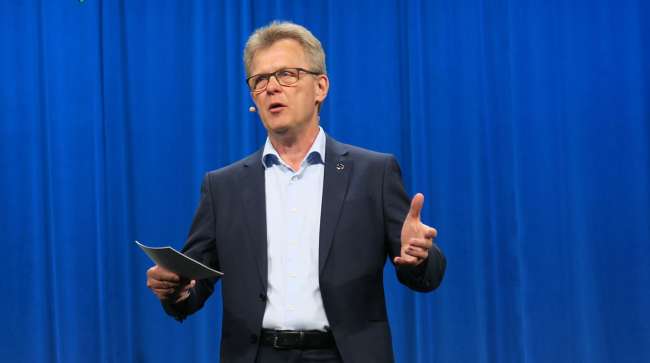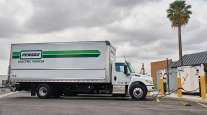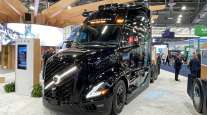Staff Reporter
Alm: Heavy-Duty EV Adoption Must Include Carbon Pricing

[Stay on top of transportation news: Get TTNews in your inbox.]
LAS VEGAS — Expediting adoption of heavy-duty battery-electric trucks is a multifactor conundrum, but the answer must include a price on carbon dioxide emissions, Volvo Trucks President Roger Alm said May 20.
Speaking at ACT Expo 2024, Alm said a price on carbon dioxide emissions would generate a completely new game plan when it comes to battery-electric and other alternative-fuel trucks.
“Emitting carbon dioxide must come with a cost,” he said in the conference’s opening keynote speech.
In the U.S., California operates a carbon market covering 400 facilities and emissions from the power, industrial, transport and buildings sectors. A further 11 Northeast and Mid-Atlantic states participate in a market trading emissions from power plants. However, there is no price on emissions in nearly all other states or other sectors that produce the GHG.
Taking battery-electric trucks to the next level of adoption will take changes in charging, the amount of green energy available, a lower total cost of ownership, wider incentives and the price on carbon dioxide emissions, said Alm.
.@VolvoTrucksNA reveals its new Volvo VNL Autonomous model equipped with @aurora_inno’s self-driving system at @ACTExpo. pic.twitter.com/oTZaDYqZ6f — Seth Clevenger (@SethClevenger) May 21, 2024
“We need a massive amount of charging stations, and we need them now,” he said, identifying charging infrastructure expansion as paramount in its importance.
“We need public charging on roads. This is not the case in the U.S., not in Europe and not in the rest of the world. There needs to be public investment. There needs to be private investment,” Alm said.
Adoption of battery-electric trucks, he said, is a complex equation — including variables such as trucks, charging, grid capacity and total cost of ownership, with the plus sign as the operator of the formula in all cases — and if any of the variables is zero then the transformation will not work.
Volvo expects all the new trucks it sells to be zero-emission vehicles by 2040.
The company’s three-prong path involves battery-electric, hydrogen fuel cell electric and renewable fuel powertrains.
However, battery-electric trucks will be the biggest part of Volvo’s push to zero emissions, said Alm.
The #AllNewVolvoVNL is optimized for driving efficiency and comfortable living.
More info: https://t.co/vO84JQeamX #volvotrucks #energyefficiency #aerodynamics pic.twitter.com/pBbue0DpXD — Volvo Trucks (@VolvoTrucks) May 20, 2024
Volvo Trucks has 3,500 battery-electric trucks on the road. “It shows battery-electric trucks are part of our customers’ business already,” he said.
But building battery-electric trucks requires a completely different way of thinking, he said, noting truck makers cannot just put an electric drivetrain in a chassis and cab designed for a diesel truck.
Volvo is still building diesel trucks but also is cutting emissions from key models in its lineup in North America and Europe, including the redesigned VNL tractor launched in January, and the order book for which opened in April.
The latest VNL tractor reduced emissions compared with earlier iterations of Volvo Truck North America’s flagship sleeper truck by 10%.
Alm told ACT attendees that emissions produced by the company’s flagship European heavy-duty truck, the FH, are down 20% over the past five years with the changes made over that time frame.
From aerodynamic heavy-duty long-haulers to flexible, adaptable, electric city trucks, there’s sure to be something in our new lineup that meets your requirements. https://t.co/nEiQrehpkq #volvotrucks #volvotrucksaero #allnewvolvovnl #energyefficiency #aerodynamics pic.twitter.com/AclySTNUfz — Volvo Trucks (@VolvoTrucks) May 17, 2024
On April 16, the company said all of its European trucks — the FL, FE, FM, FMX, FH and FH16 — were now able to run on 100% biodiesel. The “well to wheel” carbon dioxide emissions reduction offered by using biodiesel is between 30% and 70% compared with traditional diesel fuel, depending on the type of raw material used to produce the fuel, it noted.
Volvo’s combustion engines also will be powered by hydrogen and other renewable gases. Volvo and Westport Fuel System’s High Pressure Direct Injection fuel system joint venture is expected to become operational in the second quarter of this year. Early in May, the JV received European Commission approval. The companies formalized the partnership in March after inking a nonbinding letter of intent in July.
Alm said decarbonizing trucking is about meeting demand and cutting emissions.
“This is our biggest challenge ever; both to meet this demand and reduce emissions,” he said.
“There is no silver bullet,” Alm said, adding that change would look differently in various parts of the world. “Yes, our industry has big challenges. We have to meet them. Together, we can shape the world we live in.”
Want more news? Listen to today's daily briefing below or go here for more info:




